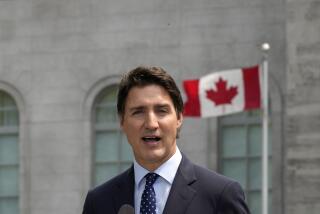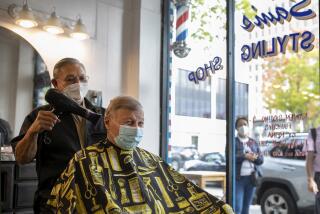Column: I’m in Canada, where the COVID police are watching

PORTAGE LAKE, Ontario — For two weeks, we waited for the pandemic police to come.
In mid-July, my wife and I headed on vacation to a rustic cabin her father built 65 years ago on a small lake north of Toronto.
Most Americans can’t visit Canada these days. Because of the coronavirus threat, both countries have closed their borders to nonessential traffic.
But my spouse is a dual U.S.-Canadian citizen, so we were allowed in — as long as we agreed to quarantine ourselves for 14 days.
Not a symbolic, wear-a-mask-and-keep-your-distance-but-go-about-your-business quarantine; a real one — no venturing beyond the cabin and the dock. No shopping trips, no long walks, no visitors.
And no swimming in the lake — a question I rashly asked one of the public health officers who telephoned almost every day to check on us.
“I’m sorry, but no,” he said. “It’s a public lake. You might run into someone out there. And if you got into trouble, someone would have to fish you out.”
“I’m really sorry,” he added. He sounded like he meant it.
But he also reminded me that the Ontario Provincial Police could show up at any time to make sure we weren’t breaking the rules — and that we could be fined the equivalent of U.S. $206 to $1,125.
He wasn’t kidding. In June, two Ontario men who violated quarantine after a visit to Minnesota were each fined about U.S. $850. Seven Americans who took an unauthorized hike in Banff National Park were each fined about U.S. $900.
It’s one reason Canada is doing so much better in this pandemic than we are: Unlike Americans, they set tough rules — and mostly obey them.
The U.S. Centers for Disease Control and Prevention set guidelines to help governors decide when it was safe to reopen their states for business. But President Trump urged governors to ignore those rules, and many did — producing COVID-19 outbreaks across more than half the country.
That didn’t happen in Canada. Just as in the United States, most decision-making on health is at the level of provinces, not the federal government led by Prime Minister Justin Trudeau. But Trudeau urged caution, not recklessness, and provincial leaders followed suit — even those from the opposition Conservative Party.
The result: The United States has suffered almost twice as many COVID-19 deaths as Canada on a per capita basis.
Canada’s response to the crisis hasn’t been perfect. Its two biggest provinces, Quebec and Ontario, saw severe outbreaks in April and May. A wave of infections swept through nursing homes, claiming some 7,000 dead, about 80% of the country’s total.
Quebec, which allowed bars to reopen in June, may have acted a little early; the province suffered a mini-outbreak in July.
But elsewhere, reopening has been more deliberate. Toronto, the country’s largest city, allowed bars and restaurants to resume indoor service — with lots of spacing — only last week.
As a result, the epidemic’s spread has slowed. Canada reported 3,043 new cases last week; California, whose population is only slightly larger, reported more than 55,000.
It’s hard to avoid giving some credit to the elusive notion of national character: Canadians — unlike Americans — pride themselves on being a nation that generally follows the rules.
Last month, when Major League Baseball asked Trudeau’s government to relax the quarantine regulations to allow U.S. teams to enter Canada to play against the Toronto Blue Jays, the government refused — and exiled the Blue Jays to play out the season in the United States. It’s hard to imagine any U.S. politician doing that to a hometown team.
“Americans celebrate independence, individualism, personal liberty; many distrust government [and] resent politicians,” columnist Andrew Cohen wrote in the Ottawa Citizen. “Canadians accept big government, which is how we built the social welfare state…. We defer to authority.”
Last week, Trudeau unveiled a government-sponsored smartphone app that will notify users if someone they’ve been in contact with tests positive for COVID-19. More than a million Canadians downloaded it within three days.
In the United States, the proposed use of contact-tracing apps has sparked furious debate over invasions of privacy. In Canada, the main controversy has been that the app works only for those with up-to-date Apple or Android phones, so low-income people and the elderly may not have access.
Canada does have anti-government skeptics, of course. Anti-mask crusaders held small protests in Toronto and Montreal. But they attracted only a handful of supporters — and they didn’t get public backing from any major politician.
From what we could see, mask-wearing appears almost universal in cities and small towns. And businesses are diligent about requiring patrons to sanitize their hands when they enter. I discovered that when I walked into a liquor store and forgot to sanitize; an elderly clerk chased me down the aisle with a spray bottle in her hand.
Alas, the pandemic police never showed up to inspect us during our 14-day quarantine. They relied on our sense of civic responsibility — and those threats of giant fines — to keep us in line.
But that’s the point.
Canada hasn’t needed heroic or draconian measures beyond an initial lockdown to get the pandemic under control. All it needed was a set of sensible rules — and, crucially, a consensus across political parties that the rules were there to be followed.
That path was available to the United States, too. It’s a shame we didn’t take it.
More to Read
Get the L.A. Times Politics newsletter
Deeply reported insights into legislation, politics and policy from Sacramento, Washington and beyond. In your inbox three times per week.
You may occasionally receive promotional content from the Los Angeles Times.











